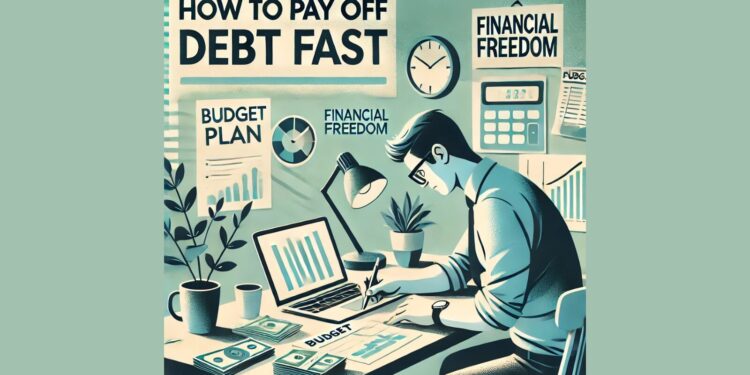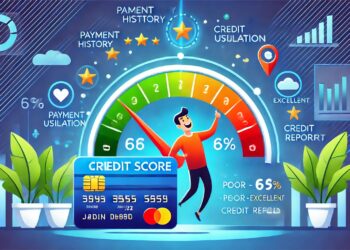Getting out of debt is a goal for many, and for good reason.
Whether it’s credit card bills, student loans, or car loans, paying off debt fast can help you achieve financial freedom and significantly reduce stress.
The sooner you get out of debt, the more money you’ll have for savings, investments, and enjoying life.
✅ Why Paying Off Debt Quickly is Important
- Financial Freedom: The less money you owe, the more you control your finances.
- Lower Stress: Debt can be mentally exhausting. Paying it off can relieve that burden.
- Build Wealth: The sooner you pay off debt, the more you can save and invest for the future.
💡Understanding Debt: The Different Types
Debt can be overwhelming, but understanding the different types is key to figuring out how to tackle it.
Secured vs. Unsecured Debt
- Secured debt is backed by assets (e.g., a mortgage or car loan).
- Unsecured debt doesn’t have collateral (e.g., credit card debt, medical bills).
Good Debt vs. Bad Debt
- Good debt can help build your financial future, like student loans or a mortgage.
- Bad debt is often high-interest debt that doesn’t contribute to your long-term wealth, such as credit card debt.
Common Types of Debt
- Credit Cards
- Student Loans
- Car Loans
- Mortgages
How Debt Affects Your Financial Health
Debt can hurt your finances in more ways than one.
Interest Rates and Compounding Debt
The higher the interest rate, the more money you pay over time.
Compounding interest means the debt can grow faster than you expect.
Impact on Credit Score
Your credit score drops with missed payments or high debt balances, making it harder to borrow in the future.
Psychological Burden of Debt
Debt isn’t just financial; it affects your mental health. The constant worry can keep you up at night.
Step 1: Create a Debt Payoff Plan
The first step in paying off debt is creating a plan.
Assess Your Total Debt
- Write down all your debts, including balances, interest rates, and minimum payments.
- This gives you a clear picture of what you’re working with.
Choose a Debt Repayment Strategy
Pick one of the following methods to pay off your debt effectively.
Step 2: Use the Debt Snowball Method
This method helps build momentum and motivation.
What is the Debt Snowball Method?
- Pay off your smallest debt first.
- Once that’s paid off, focus on the next smallest debt, and so on.
How It Builds Motivation
The quick wins will keep you motivated to continue tackling larger debts.
Step-by-Step Implementation
- List your debts from smallest to largest.
- Focus on paying off the smallest one, then move on to the next.
Step 3: Use the Debt Avalanche Method
The debt avalanche method is great for saving money.
How It Saves Money
- Pay off high-interest debt first.
- This minimizes the amount you’ll pay in interest.
Prioritizing High-Interest Debt
Focus on credit cards or personal loans with the highest interest rates.
When to Use This Method
- Use this method if you want to save money on interest payments in the long run.
Step 4: Consider Debt Consolidation
Debt consolidation can make paying off multiple debts easier.
What is Debt Consolidation?
- Combine multiple debts into one loan or credit card with a lower interest rate.
Benefits of Debt Consolidation
- Simplifies your payments.
- May lower your interest rates.
Best Debt Consolidation Options for 2025
- Balance transfer credit cards
- Personal loans for debt consolidation
- Home equity loans (if applicable)
Step 5: Increase Your Income to Pay Off Debt Faster
The more money you bring in, the faster you can pay off your debt.
Side Hustles and Freelance Work
- Freelancing, gig economy jobs, or online businesses can bring in extra cash.
Negotiating a Raise
- Ask for a raise at your current job to increase your income.
Selling Unused Items for Extra Cash
- Consider selling unused items to boost your debt repayment.
Step 6: Reduce Expenses and Live Frugally
Cutting back on expenses helps free up more cash for debt repayment.
Identifying Unnecessary Expenses
- Review your monthly expenses and cut back on non-essentials.
Budgeting Techniques for Cutting Costs
- Follow a strict budget to limit unnecessary spending.
Using Cashback and Discount Programs
- Take advantage of cashback rewards, coupons, and discount programs to save money.
Step 7: Use Windfalls and Bonuses Wisely
Unexpected money, like tax refunds or bonuses, can give you a big boost.
How to Allocate Windfalls Toward Debt
- Use your tax refund, bonus, or other windfalls directly to pay off debt.
Avoiding the Temptation to Spend Unexpected Money
- Don’t use windfalls for non-essential purchases. Prioritize debt repayment.
Step 8: Avoid Taking on New Debt
The goal is to stop digging a deeper hole.
Why Avoiding New Debt is Crucial
- Avoiding new loans or credit cards prevents your debt from growing.
Managing Financial Emergencies Without Borrowing
- Build an emergency fund to cover unexpected costs without going into debt.
Step 9: Negotiate Lower Interest Rates
Negotiating your interest rates can save you money over time.
Contacting Creditors for Better Terms
- Ask your credit card companies or loan providers for a lower interest rate.
Transferring Balances to Lower-Interest Credit Cards
- Consider transferring high-interest balances to cards with a 0% intro APR.
Refinancing Options for Loans
- Refinancing personal loans or student loans could save you money.
Step 10: Seek Professional Help If Needed
If you’re struggling to make progress, professional help can provide guidance.
When to Consider Credit Counseling
- If your debt feels unmanageable, credit counseling can help you create a plan.
Debt Management Programs
- These programs can consolidate your debts into one payment, often with a lower interest rate.
Bankruptcy as a Last Resort
- Consider bankruptcy only if other options have failed and you can’t afford to pay your debts.
❓ Frequently Asked Questions (FAQs)
- How long does it take to pay off debt?
The time depends on the amount of debt, your payment plan, and how much extra you’re paying each month. - Should I pay off debt or save money first?
Prioritize high-interest debt. Once it’s paid off, focus on building savings. - Does paying off debt improve my credit score?
Yes, paying off debt lowers your credit utilization and improves your score. - What’s the best way to pay off credit card debt?
The debt avalanche method is ideal for credit card debt because it targets high-interest balances first. - Are debt relief programs a good idea?
Debt relief programs can help, but make sure to research and choose reputable providers. - How can I stay debt-free once I pay everything off?
Build an emergency fund, avoid high-interest debt, and stick to a budget.
Conclusion
Paying off debt fast is completely possible with the right strategies.
By creating a clear plan, using methods like the debt snowball or avalanche, and reducing your expenses, you can regain control of your finances.
Stay committed to your goals, and remember that every step forward brings you closer to financial freedom.









